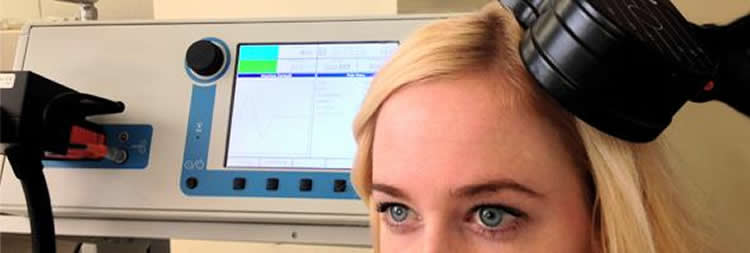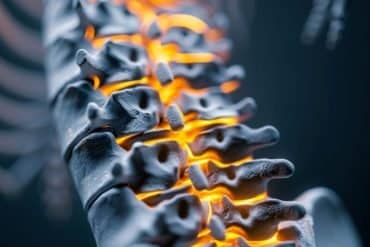Summary: Researchers target the cortical hippocampal network with non-invasive brain stimulation to help improve precise memory.
Source: Northwestern University.
Precise memory is enhanced with targeted non-invasive brain stimulation.
Northwestern Medicine scientists showed for the first time that non-invasive brain stimulation can be used like a scalpel, rather than like a hammer, to cause a specific improvement in precise memory.
Precise memory, rather than general memory, is critical for knowing details such as the specific color, shape and location of a building you are looking for, rather than simply knowing the part of town it’s in. This type of memory is crucial for normal functioning, and it is often lost in people with serious memory disorders.
“We show that it is possible to target the portion of the brain responsible for this type of memory and to improve it,” said lead author Joel Voss, assistant professor of medical social sciences at Northwestern University Feinberg School of Medicine. “People with brain injuries have problems with precise memory as do individuals with dementia, and so our findings could be useful in developing new treatments for these conditions.”
By stimulating the brain network responsible for spatial memory with powerful electromagnets, scientists improved the precision of people’s memory for identifying locations. This benefit lasted a full 24 hours after receiving stimulation and corresponded to changes in brain activity.
“We improved people’s memory in a very specific and important way a full day after we stimulated their brains,” Voss said.

The paper was published Jan. 19 in Current Biology.
The research enhances scientific understanding of how memory can be improved using noninvasive stimulation. Most previous studies of noninvasive brain stimulation have found only very general and short-lived effects on thinking abilities, rather than highly specific and long-lasting effects on an ability such as precise memory.
The scientists used MRI to identify memory-related brain networks then stimulated them with noninvasive electromagnetic stimulation. Detailed memory tests were used to show that this improved spatial precision memory, and EEG was used to show that these memory improvements corresponded to indicators of improved brain network function.
Other Northwestern authors include first author Aneesha S. Nilakantan, Donna J. Bridge, Elise P. Gagnon and Stephen A. VanHaerents.
Funding: The research was supported by grants P50-MH094263, R01-MH106512, and R01-MH111790 from the National Institute of Mental Health, T32-AG20506 from the National Institute on Aging and F32-NS087885 from the National Institute of Neurological Disorders and Stroke, all of the National Institutes of Health.
Source: Bob Marcotte – Northwestern University
Image Source: NeuroscienceNews.com image is credited to Northwestern University.
Original Research: Abstract for “Stimulation of the Posterior Cortical-Hippocampal Network Enhances Precision of Memory Recollection” by Aneesha S. Nilakantan, Donna J. Bridge, Elise P. Gagnon, Stephen A. VanHaerents, and Joel L. Voss in Current Biology. Published online January 9 2017 doi:10.1016/j.cub.2016.12.042
[cbtabs][cbtab title=”MLA”]Northwestern University “Brain Stimulation Used Like a Scalpel To Improve Memory.” NeuroscienceNews. NeuroscienceNews, 19 January 2017.
<https://neurosciencenews.com/memory-brain-stimulation-5966/>.[/cbtab][cbtab title=”APA”]Northwestern University (2017, January 19). Brain Stimulation Used Like a Scalpel To Improve Memory. NeuroscienceNew. Retrieved January 19, 2017 from https://neurosciencenews.com/memory-brain-stimulation-5966/[/cbtab][cbtab title=”Chicago”]Northwestern University “Brain Stimulation Used Like a Scalpel To Improve Memory.” https://neurosciencenews.com/memory-brain-stimulation-5966/ (accessed January 19, 2017).[/cbtab][/cbtabs]
Abstract
Stimulation of the Posterior Cortical-Hippocampal Network Enhances Precision of Memory Recollection
Highlights
•Network-targeted stimulation caused lasting, selective increase in memory precision
•Stimulation reduced evoked oscillatory neural correlates of recollection
•The hippocampal posterior-medial network is causally involved in memory precision
Summary
Episodic memory is thought to critically depend on interaction of the hippocampus with distributed brain regions. Specific contributions of distinct networks have been hypothesized, with the hippocampal posterior-medial (HPM) network implicated in the recollection of highly precise contextual and spatial information. Current evidence for HPM specialization is mostly indirect, derived from correlative measures such as neural activity recordings. Here we tested the causal role of the HPM network in recollection using network-targeted noninvasive brain stimulation in humans, which has previously been shown to increase functional connectivity within the HPM network. Effects of multiple-day electromagnetic stimulation were assessed using an object-location memory task that segregated recollection precision from general recollection success. HPM network-targeted stimulation produced lasting (∼24 hr) enhancement of recollection precision, without effects on general success. Canonical neural correlates of recollection were also modulated by stimulation. Late-positive evoked potential amplitude and theta-alpha oscillatory power were reduced, suggesting that stimulation can improve memory through enhanced reactivation of detailed visuospatial information at retrieval. The HPM network was thus specifically implicated in the processing of fine-grained memory detail, supporting functional specialization of hippocampal-cortical networks. These findings demonstrate that brain networks can be causally linked to distinct and specific neurocognitive functions and suggest mechanisms for long-lasting changes in memory due to network-targeted stimulation.
“Stimulation of the Posterior Cortical-Hippocampal Network Enhances Precision of Memory Recollection” by Aneesha S. Nilakantan, Donna J. Bridge, Elise P. Gagnon, Stephen A. VanHaerents, and Joel L. Voss in Current Biology. Published online January 9 2017 doi:10.1016/j.cub.2016.12.042






